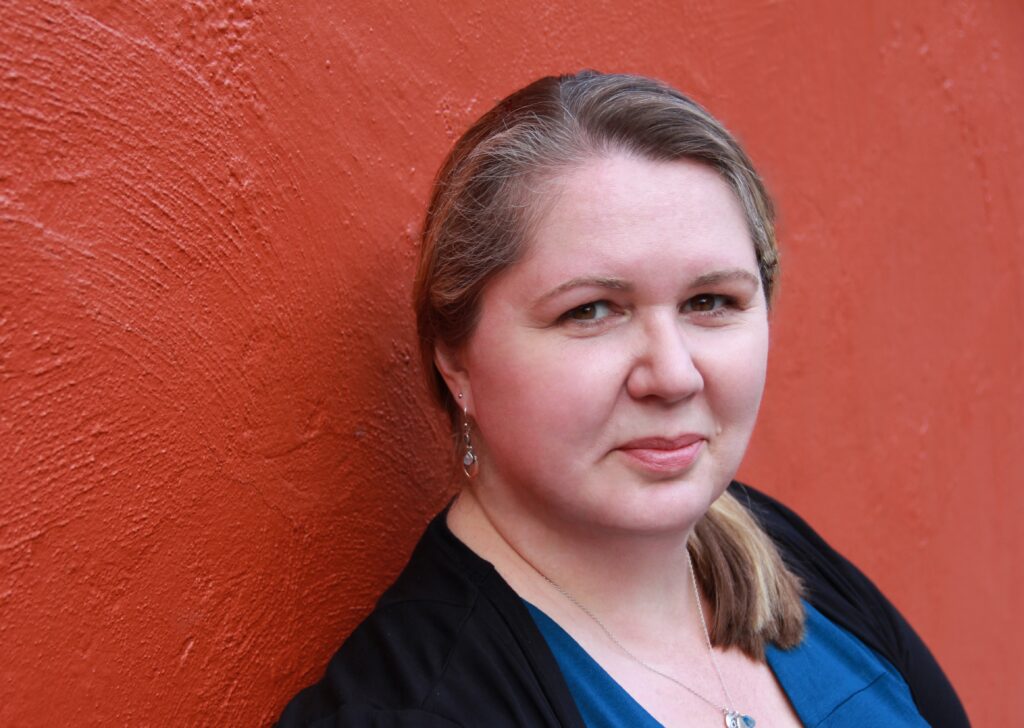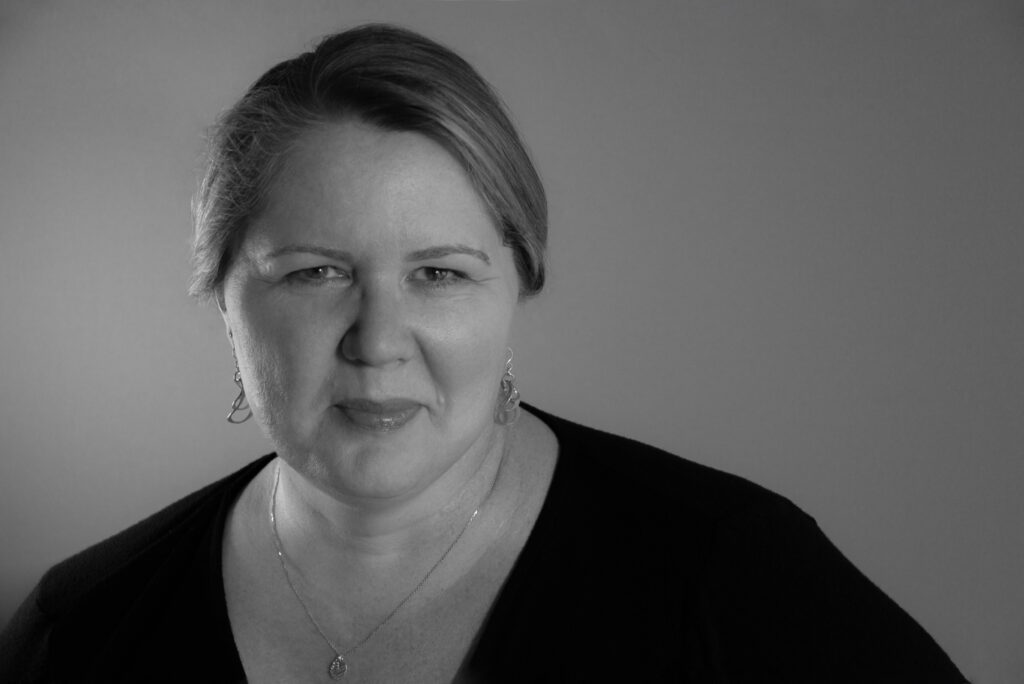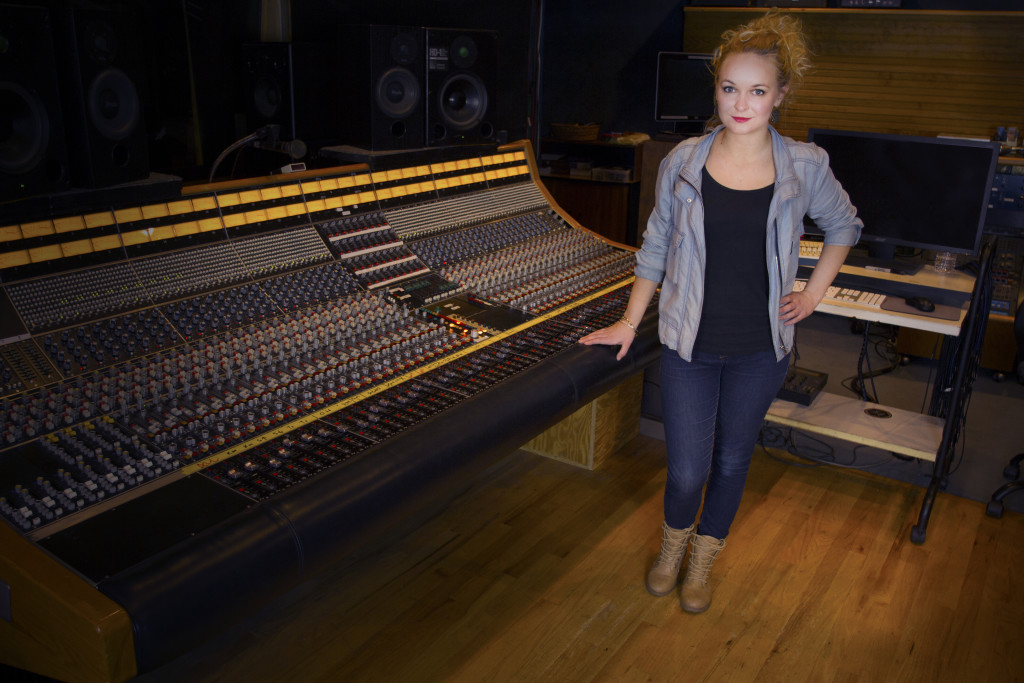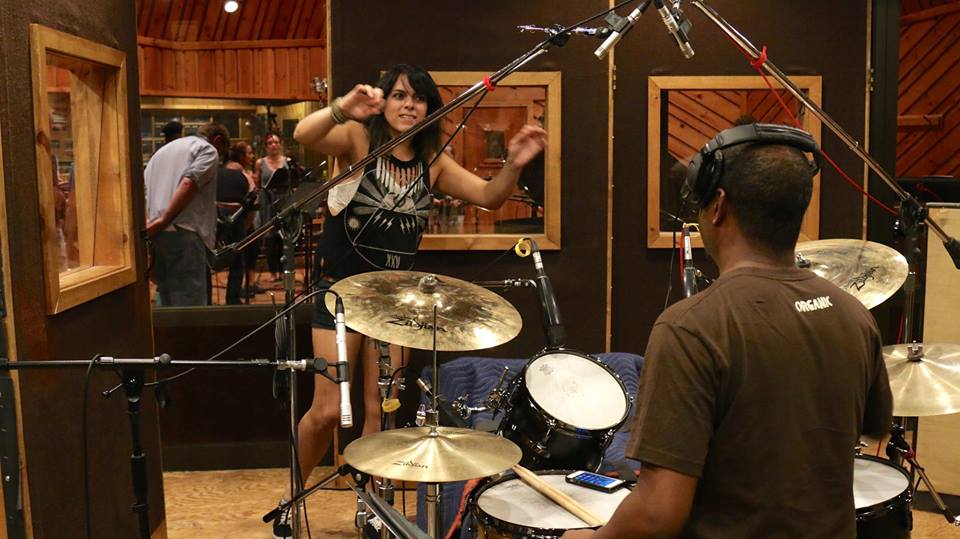Joanna Lynne Staub is a highly accomplished freelance sound designer, composer, and audio engineer with over 30 years of experience spanning Broadway, Off-Broadway, and regional theatre, as well as live events, corporate audio, concerts, television, and podcasts. As an independent contractor, she is a proud member of USA829 as a sound designer and IATSE as an audio engineer.
Currently, Joanna is engaged in exciting projects, including sound design and composition for George Street Playhouse and American Players Theatre. Currently, Joanna is working on the renovation of the sound system at the Hayden Planetarium and the creation of the new Space Show at the Museum of Natural History in NYC. In addition to her theatrical work, she is an audio engineer for ABC Television, Clair Global, and the podcast Playing on Air.
Early Life & Passion for Audio
Joanna’s deep connection to music and audio was ingrained from childhood. Growing up in a family of musicians and audiophiles, discussions on music production, performance, and history were a daily part of life. Surrounded by an eclectic mix of records and radio broadcasts, she developed an early fascination with sound and live performance.
Her interest in audio as a career path emerged during undergraduate studies, fueled by a passion for music production and the culture of live performances. Attending concerts at a young age, she became captivated by the behind-the-scenes execution of live sound.
Educational Background & Training
Joanna holds a Bachelor of Science in Audio Engineering from Ithaca College and a Master of Fine Arts in Sound Design & Technical Theatre from the University of Illinois Urbana-Champaign. Her formal training encompasses music, sound design, audio engineering, and technical theatre. As a classically trained flutist, she also has a background in composition and orchestration, which informs her work in sound design and music integration.
A Multifaceted Career
Throughout her extensive career, Joanna has worked across a wide range of theatrical productions, live events, and broadcast audio, demonstrating expertise in both creative sound design and technical engineering. Her work continues to shape the auditory experiences of audiences across multiple entertainment industries.
With an unwavering passion for sound, storytelling, and performance, Joanna Lynne Staub remains a respected and sought-after professional in the field of audio and theatrical design.
Career Start
How did you get your start?
My first job doing sound for theatre was as an intern audio engineer at the Hangar Theatre in Ithaca, NY. Then, I took a gap year between Undergraduate and Graduate School. During that year, I worked as an Audio Engineer at the Santa Fe Opera and then at the Arena Stage in Washington DC. I moved to NYC after completing Graduate school, and have been based there ever since.
How did your early internships or jobs help build a foundation for where you are now?
While in undergraduate school, I did internships in both theatre & recording studio engineering, learning fairly quickly that I prefer doing sound for live events. I enjoy the interaction with live audiences. But I deeply appreciate the skills and connections I made while working in a recording studio – and I have a great appreciation of the level of detail & creativity required to do studio engineering well.
What did you learn interning or on your early gigs? – Never look down on anyone you are working with. Someone who is your assistant today may be your boss tomorrow. Everyone in the room has skills that you can learn from – and you should.
Did you have a mentor or someone that really helped you? – While studying at Ithaca College, Dr. Peter Rothbart & Dr. John Bracewell were incredibly influential in starting me out on my career path. After I moved to NYC, Carin Ford & Beth Berkley were mentors who helped me learn how to navigate the Broadway community.
Career Now
What is a typical day like?
What I love about my job is that it is ever-changing, and no two days are the same. Different points in the process have vastly differing days – also changing based on what job I am working on a particular project.
Early in the production process, known as pre-production, I spend a lot of time at my home office preparing shop bids and design paperwork, along with taking creative meetings with the director and other collaborators.
Once a show is in rehearsal, I will go as often as possible to see what the director and actors have dreamed up, as well as look at timing for required sound design and compositional effects, which I am building at the same time. Whenever possible, we will add recorded sound cues into the rehearsal process for the actors to work with and see if they are appropriate for the production. If a show is a musical, I will also attend band rehearsals and provide audio support for the Sitzprobe rehearsal – which is the first time that the cast and band are in a room together rehearsing.
If a show or project has hired all or part of a sound system, the audio team will spend a chunk of time at a rental shop. During this process, we work with the shop gathering all of the gear into one space, setting up the entire sound system, and testing every piece of gear to make sure it works as specified. This includes everything from setting up computer programs and FOH console programming to running test rigging of speaker hangs, along with testing every piece of cable in between. After the testing is complete, we have to organize and pack all of the gear to be shipped to the theatre or performance location in a manner where we can find everything we need whenever we require it.
Loading in a sound system can take anywhere from a few hours to a few months depending on the size and scope of the project. Broadway Theatres have almost no sound gear permanently installed – entire sound systems are loaded in from scratch at the start of every show, and have to be loaded out at the end. This includes the sound system for the audience, pit orchestra, onstage effects and foldback, as well as backstage communications at CCTV required for the show. It is an extremely laborious process that takes a skilled crew to accomplish safely. I often tell people to imagine the largest show you’ve ever worked on, and put it in the smallest space you’ve ever been in. That’s Broadway – big shows in theatres that are 100s of years old and never meant to hold shows of this size. But we make it work with a lot of planning and hard work.
After load-in is complete, technical rehearsals begin. These are long days at the theatre making sure every cue and every sound level is perfect and works with performers and other design elements. This quickly moves into the preview process – where we work during the day making adjustments to the show, while giving public performances in the evening. This process allows us to “test out” how a show works in front of an audience while making changes during the daytime rehearsals. After we complete the preview process, a show is frozen – when we stop making changes, but continue to perform preview performances to practice the final show – until the show officially opens.
Once a show is open, the process of running & maintaining a project begins. Some Broadway shows can run for years – and keeping them maintained is a whole other procedure. It often starts with cross-training staff, which means that the various audio engineers on the show learn how to do each other’s primary jobs so they can cover each other when necessary. The backstage audio engineer will often learn how to mix the show, and vice versa, as well as additional substitute staff training. Gear is tested daily, and maintained with proper cleaning & replacement as needed. This is in addition to executing eight or more performances per week. The designers and production staff who work on the show will not be at the theatre every day, but will often visit to check in and make sure that things are running smoothly and supply support as needed.
When a Broadway show reaches the end of its run, all of the gear must then be loaded out and returned to the rental house. Again, this is a multi-day process of removing every item that the show rented and returning it to the rental company. Every piece of audio gear – from large speakers to the smallest adaptor – needs to be accounted for and returned. If a piece of gear is missing, the show must pay the rental house for the replacement cost of the item.
Most Broadway theatres are considered historic landmarks, and therefore must be restored to their landmark state at the end of each production. This work doesn’t always fall to the show’s staff – but is usually completed in the days following the end of load out.
What is important to note is that many people who work on Broadway are often working on several projects simultaneously. It is not unusual for an independent contractor like myself to be working on the pre-production stage of one project while sitting in technical rehearsal for another. It’s a huge balancing act that is often only accomplished by having a skilled team working with you.
How do you stay organized and focused?
To stay organized, I take a lot of notes & write everything down. 95% of what I write down, I never look at again. But, the process of taking notes has always been how I learn & remember things. I recently moved to being paperless, which has been huge. Finding the right software to use to keep files organized & to be able to find the information I need when I need it was key.
Staying focused is a different story. I have often found that the best way to stay focused is to not do too much at once – not always an easy task. Pacing myself & not leaving things to the last minute is key. But also acknowledging that if I find my mind wandering or I get distracted, taking a break or walking away for a second (when possible) makes it easier to restart a project.
What do you enjoy the most about your job?
All of the interesting people I meet, the amazing places I get to go, and regularly getting to be a part of “once in a lifetime” experiences. I also love NOT working in a cubicle.
What do you like least?
Long hours & sore feet. And constantly hustling for the next job.
If you tour, what do you like best?
I toured for about 7 years with various Broadway 1st National Tours. I was very fortunate to be touring at a time when large shows did long sit-downs in big cities – more than they do now. I loved bringing Broadway shows all over the country while having enough time to explore and learn about the places we were visiting.
What is your favorite day off activity?
When I’m at home in NYC, I enjoy bike riding & yoga, and also having good food & drinks with friends. When I’m traveling, I like to get lost in whatever city I am in – exploring, finding new things & meeting new people.
What are your long term goals? –
Getting more women hired as sound designers on Broadway – including myself. Broadway has a long history of having a lot of women audio engineers. But, very few women have reached the top levels of sound design – especially for large musicals. Before the pandemic, only 2-3% of Broadway shows in a season were sound designed by women. Since Broadway re-opened in 2023, closer to 8-10% of Broadway shows are designed by women – but a majority of those shows are done on smaller shows with smaller paychecks. We can and must do better. There are a lot of extremely talented women designers who are not being afforded the same opportunities as our male colleagues.
What if any obstacles or barriers have you faced?
The same barriers that almost every woman of my age who works in audio has experienced. “Backwards and in heels” is a real thing – women have to work harder and be better to get half the distance of our male colleagues. Women of my generation had to keep our mouths shut and tolerate – if not play along – with bad behavior and mistreatment. It is getting better. And I owe a lot to some of my younger women colleagues for teaching me to finally speak up. I’m glad to see the culture is changing.
How have you dealt with them?
Lots of dinners and drinks with the girls. Having a strong support system of allies makes all the difference. In recent years, feeling able to speak up when things are wrong has been a huge change from what we dealt with previously. And just staying determined.
Advice you have for other women who wish to enter the field?
Find the places that are the best ways for you to learn. Not everyone will benefit from a college degree or a master’s program. But you have to find out how to learn the skills required for the position you desire. There are options.
Understand that you will always be marketing yourself. Do not hesitate to reach out to the people you want to work with and introduce yourself. They are rarely going to seek you out. Know that, at some point in their career, they were doing the same thing to someone they admired.
And lastly – know where you want to be at the end of your career and plan for it as early as possible. If that means having a family, or children, or retiring in the Caribbean, you have to think about it as early as possible. (I admit that I am stealing that one from some amazing female colleagues who said it to me once).
Must have skills?
Theatrical Sound Design has become far more complicated than it was when I first started in the industry. If you are going to work in commercial entertainment, you need to understand both artistic/creative design AND technical system design, even if your work is primarily focused on one or the other. Having a baseline understanding of music and acoustics is important. And lastly – computer networking. Almost every aspect of professional audio involves networks now, and the more you know the better off you will be.
Favorite gear?
iZotope plug-ins. Neutron, Nectar, Ozone & RX Suites. I use them as limitless tools while working in content creation, composition, editing, and post-production work.
Closing Thoughts
I’ve been in this industry for a very long time. I started out in regional theatre, then off-Broadway, touring, and Broadway. I’ve worked in every job there is in live theatre. But I have also worked extensively in live television, concerts, corporate events, and sports. I’m very proud of all of the work that I have accomplished – having depth to my skill set allows me to fluidly shift between jobs & provides me with more opportunities. Not everyone can offer that. This level of flexibility is essential if you are going to work in live entertainment – especially as an independent contractor. The more you bring to the table, the more options that should be available to you. Don’t pigeonhole yourself. You will find amazing experiences in places you were not necessarily looking.
Understand that it’s still not uncommon to be one of the only women in the room. Despite a lot of people’s best efforts, women are still not treated equally. Even our closest colleagues don’t always realize that. Be prepared – and find the people who are your true allies quickly. It takes a lot of courage and resilience to get & stay here.
Don’t get down on yourself – you are not imagining how hard it is sometimes. I know a lot of people who think they suffer from imposter syndrome. Just know that you are not lesser than anyone else in the room – you are often just working with amazing people who are challenging your skills. Challenge theirs in return. You deserve to be there.





